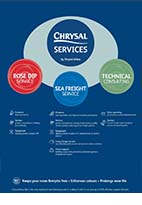Featured Past Articles
 Description
Description
Downy mildew is a fungal disease that causes destruction of leaves, stems, and flowers of the infected plant. Downy mildew causal organism is called Peronosporasparsa and as the scientific name indicates, the production of spores is sparse and therefore this disease is difficult to diagnose and control.
- Downy mildew (Oomycete fungi) are referred to as a high risk pathogens because of the following factors;
- Oomycetes fungi are able to spread in an explosive manner under favorable conditions.
- Short development cycle (8-10 days under optimum conditions)
- High potential for reproduction (high quantities of spores)
- Wide propagation by water and wind
- Damage is not reversible: The damaged tissues die in general leading quickly to substantial losses at harvest
- High genetic variability: Rapid appearance of strains less sensitive to specifically acting fungicides possible.
 In the last 10 years biocontrol in Kenya has grown from a concept and wish, to a major crop protection strategy in reality. This transition has occurred as a result of various driving forces including consumer demand, overcoming pesticide resistance and environmental concern. However, the wide spread adoption by Kenyan growers has only been achieved through locally available biological control agents and service providers that provide affordable biological solutions. The biological industry has recognised that for the technology to be effectively adopted it has to be affordable and effective which often means local in-country production.
In the last 10 years biocontrol in Kenya has grown from a concept and wish, to a major crop protection strategy in reality. This transition has occurred as a result of various driving forces including consumer demand, overcoming pesticide resistance and environmental concern. However, the wide spread adoption by Kenyan growers has only been achieved through locally available biological control agents and service providers that provide affordable biological solutions. The biological industry has recognised that for the technology to be effectively adopted it has to be affordable and effective which often means local in-country production.
As local companies have become established that both produce and service customers’ needs through technical advice, training and products, there has been a need to have an organisation that represents the biocontrol industry in Kenya. The objectives of this body are to promote the technology, raise stakeholder awareness and lobby regulators and government to appreciate the merits of this technology.
The four founding members, Dudutech, Kenya Biologics, Koppert Kenya and Real IPM established IBMA Kenya (International Biocontrol Manufacturers Association of Kenya) in 2017. IBMA is a global organisation, and IBMA Kenya represents the ideals at the local level. The association was launched at the Naivasha Horticulture Fair and was awarded the show’s best innovation.
Dr Wainwright, General Manager of Real IPM said “In expanding global production areas like Kenya we have to work together as a biocontrol industry and promote our exciting technologies. We all have to make our technologies available and understood by all the agricultural stakeholders. This can be only achieved by working together and maximise the impact for both small and large scale growers.” The association welcomes new members and should contact This email address is being protected from spambots. You need JavaScript enabled to view it.. IBMA Kenya gratefully acknowledges the support the SNV through the HortiImpact programme.
Scientific facts in cold chain management 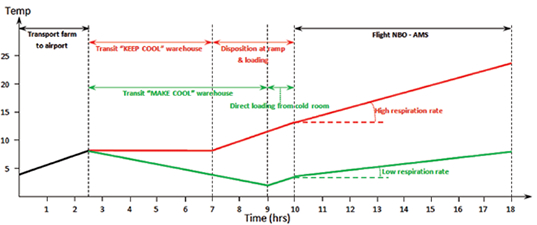 Although a scientific approach of post harvest technology for fruits, vegetables and flowers goes back to the 1970’s, many partners in the logistic chain still lack awareness and knowledge of basic principles. All efforts that the producer has made to reach top quality products may be lost within 24 hours by mismanagement of the cold chain. The small gain made by saving on the cold chain is negligible compared to the loss of value it will cause. Proper cold chain management from farm till buyer is an essential condition for the preservation of the quality and the value of a perishable product.
Although a scientific approach of post harvest technology for fruits, vegetables and flowers goes back to the 1970’s, many partners in the logistic chain still lack awareness and knowledge of basic principles. All efforts that the producer has made to reach top quality products may be lost within 24 hours by mismanagement of the cold chain. The small gain made by saving on the cold chain is negligible compared to the loss of value it will cause. Proper cold chain management from farm till buyer is an essential condition for the preservation of the quality and the value of a perishable product.
The respiratory metabolism
Cut flowers, harvested fruits and vegetables are still alive and carry on characteristic processes of all living things. The most important process is the respiratory metabolism. It is a natural process of ripening, senescence and deterioration of the plant. The bio-chemical reaction (for 1 mole): C6H12O6 + 6O2 + 6CO2 + 6H2O + 686 kcal 294 kcal of the produced energy is used for internal processes but 392 kcal is heat. Cut flowers, beans and the vast majority of Kenyan fresh produce are climacteric plants and have a very high respiration rate. The respiration is triggered by ethylene, a self-regulatory hormone produced by the plant itself.
By Ernest Muriu and Floriculture Staff
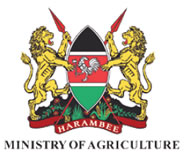 Export Processing Zone (EPZ) program was established in 1990 to provide an attractive investment opportunity for export-oriented business ventures within designated areas or zones. This sought to help the economy through increased productive capital investment, jobs generated, technology transferred, backward linkages developed and diversified exports.
Export Processing Zone (EPZ) program was established in 1990 to provide an attractive investment opportunity for export-oriented business ventures within designated areas or zones. This sought to help the economy through increased productive capital investment, jobs generated, technology transferred, backward linkages developed and diversified exports.
However, to date no one has ever answered, why is flower growing not included in the program. The sector which is predominantly an export oriented business continues to struggle with a stringent tax regime which has slowed foreign direct investment for the last five years and a relocation of a number of investors to the more lucrative Ethiopia. All this has happened under the government’s watch.
Read more: Government Should Stop Anesthetizing Floriculture Investors
By Issabella Wanjiru
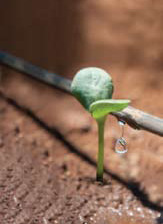 Drip irrigation is a type of micro-irrigation that has the potential to save water and nutrients by allowing water to drip slowly to the roots of plants, either from above the soil surface or buried below the surface. Drip irrigation systems distribute water through a network of valves, pipes, tubing and emitters. With the drip of an emitter, precise amounts of water are delivered directly to the plants, rootzone. Drip irrigation gives farmers much more control over where water is distributed and where it is not distributed, allowing you to use only the exact amount of water needed for each plant.
Drip irrigation is a type of micro-irrigation that has the potential to save water and nutrients by allowing water to drip slowly to the roots of plants, either from above the soil surface or buried below the surface. Drip irrigation systems distribute water through a network of valves, pipes, tubing and emitters. With the drip of an emitter, precise amounts of water are delivered directly to the plants, rootzone. Drip irrigation gives farmers much more control over where water is distributed and where it is not distributed, allowing you to use only the exact amount of water needed for each plant.
Recently Kenya experienced one of the driest seasons, and with major drought gripping various parts of the country, farmers needed reliable methods to conserve water and on the same breadth produce high quality crops. Amiran Kenya as an agricultural company with years of experience providing solutions to farmers, has answers to water shortage issues. Shay Nir Amiran’s Head of Green house and Irrigation department avers that, efficient irrigation is essential for water-wise farming. Flood, furrow, sprinkler and drip irrigation are the most common watering techniques, but the first three are notoriously inefficient. With flood or furrow irrigation, most water and nutrients moves down through the soil past the roots. Sprinkler water can evaporate or can be simply blown away, by wind, wetting leaves thus making them more susceptible to diseases.
In contrast, drip irrigation slowly delivers water to plant roots. The root zone remains moist but rarely waterlogged, creating a balance of water,oxygen and nutrients around roots for optimum growth. It also reduces root stress from flooding and drying cycles. Shay Nir states that drip irrigation can save up to 70 percent of applied water compared with a sprinkler system. Weeds are also reduced since water targets the root zone rather than aisles between rows. In addition, given that nutrients concentrate where water is, drip will help conserve nutrients because the root zone retains more water than with other irrigation systems. He also saysthat, to conserve more water,farmers’should cover drip lines and areas around plants with mulch such as Amiran’s plastic mulch. Plastic Mulches help conserve moisture by reducing evaporation. The types of plastic mulch available at Amiran are black\ white mulch and silver\black mulch.
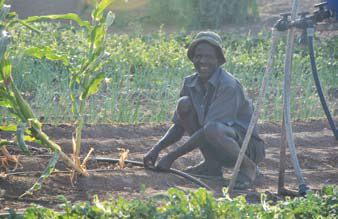 Mulch has other advantages, such as controlling annual weeds. Mulch shades soil and prevents weeds from germinating, but removes all weed seed from mulch before applying it. In colder regions, black plastic mulch also helps to warm the soil.Most organic mulches tend to slowly decompose where they touch soil, releasing nutrients for plants. Mulches also control temperatures by adjusting light, heat conditions and providing the optimal root zone temperature.
Mulch has other advantages, such as controlling annual weeds. Mulch shades soil and prevents weeds from germinating, but removes all weed seed from mulch before applying it. In colder regions, black plastic mulch also helps to warm the soil.Most organic mulches tend to slowly decompose where they touch soil, releasing nutrients for plants. Mulches also control temperatures by adjusting light, heat conditions and providing the optimal root zone temperature.
Combing drip irrigation technologies and plastic mulch is quite beneficial to farmers as they strive to conserve water during the dry periods that continue to be felt in most parts of the country. Amiran Kenya has a variety of driplines such as; drip net PC 12150, stream line 16100, Aries 16250, Netafim integral non-compensated dripper etc.
In conclusion Shay Nir adds that Amiran has water reservoirs such as Kentanks, polytanks of various capacities and dam liners of 1mm and 0.5mm, which are good for water storage. All these items are available at Amiran Kenya headquarters at Embakasi.
 Since beginning of May this year, Rob Letcher took over the helm at De Ruiter East Africa as the company’s new Managing Director. Rob has an admirable wealth of experience in floriculture, with a career that was groomed back in the early 90s. We spoke to the new MD to find out more about his journey in floriculture, personal aspirations, vision for De Ruiters East Africa and message to rose growers in East Africa.
Since beginning of May this year, Rob Letcher took over the helm at De Ruiter East Africa as the company’s new Managing Director. Rob has an admirable wealth of experience in floriculture, with a career that was groomed back in the early 90s. We spoke to the new MD to find out more about his journey in floriculture, personal aspirations, vision for De Ruiters East Africa and message to rose growers in East Africa.
Rob the manager
As a manager, team work, delegation of duties and work ethic are most important to Rob. “Nothing comes easy so I expect all team members to perform well and then enjoy the success of their labour. We will aim for better open communications, transparency and consistency in all our dealings to ensure growers get what they seek. This we trust will allow relationships to flourish on the back of our effort.”
His Mission and Vision for De Ruiter East Africa
“My mission for De Ruiters East Africa Limited is to continue developing the good brand that De Ruiters is, in “Creating Flower Business”! That challenge includes further improvement of the farm facilities, staff development training and relationship building across the region. Team spirit is a vital ingredient for our future success. I will use my market and marketing knowledge, farm background and African and European network to achieve our mission objectives. Having worked for many years abroad I am excited by my return to Africa and the challenges we face. My vision for DREA is to be the most reliable breeder for choice of varieties across all market segments. We have work to do to achieve this goal.” What Rob has to say to rose growers in East Africa. “I invite all growers to meet with me to discuss their respective strategies. It is important to know what market you are selling into and the product those market segments demand. The market is constantly changing and evolving, at an alarming rate. Be aware of this and the pros and cons of all changes for your farm. Importers and unpackers face this challenge every year too, so test these relationships to be sure of getting the right advice and answers when selecting varieties. The market is much less forgiving than it was 15 years ago. I look forward to developing good relationships that assist in making this region more professional, competent and successful. De Ruiters has some exciting new variety options across many colours being fast-tracked through selection. The future looks exciting!”
Rob’s Journey in the industry
Rob was initially introduced to the rose industry in the early 90s by his brother-in law who was a manager at a Zimbabwean Rose Farm. He didn’t immediately delve deep into roses since he was at the time involved in the Coffee Industry. He started learning more about roses and being directly involved in the industry when he was recruited by Suparose, a Zimbabwean Rose Grower Group, just before the close of 1998.
“Later on, I was tasked with establishing a Sales and Marketing company, C.A.R.M.S., in The Netherlands. I relocated to the Netherlands where I dedicated time to developing their Marketing Strategy using the Bloemenveiling Naaldwijk as our base. Sales of sweetheart roses were split across Dutch Auctions and direct market clients initially,” he recalls.
In 2003 C.A.R.M.S. relocated to the Aalsmeer region for closer proximity to their primary clients and Schiphol airport.
“We changed strategy focusing only on the direct sales market. The Dutch Auctions no longer offered a cost effective sales platform for sweetheart roses. We included product sourced from Uganda, Tanzania, Zambia and South Africa. This strategy reduced the risk of non-supply and further developed our reputation as a reliable supplier, come volcanic ash-flow scares, drought or cancelled flights. Despite losing most of our Zimbabwean farms to politics in 2004, we increased our annual sales of imported roses from 60 to 190 million stems (in 2010). Being close to the market allowed us to focus on the grower’s best interests. In the past decade our strategy further evolved focusing less on stem volume and more on quality and inclusion of Intermediate and Hybrid T roses supply from Kenyan and Ethiopian growers.”
The European market is very competitive. That competition, and the difficult economic period from 2008 through to recent years, focussed our attention on selection of the appropriate clients, transparency, improving supply and cold chains, and financial management. Low margins from the outset ensured our small team had to be cost effective and efficient. It was both a very challenging but rewarding experience.
Courtesy : Flowerweb Newsletter
Rose growers from across the East African region are naturally clamoring for new interesting varieties to include in their production lines. Kordes Roses’ new white codes have drawn a lot of interest from growers. Most have visited their show case recently and discussed some of the varieties that are quite promising. These varieties have been the most popular in trial selections inline with indications that growers are looking premium varieties.
Pallas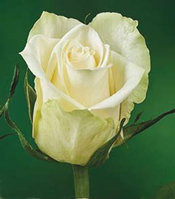 We expect to be one of a new line of white varieties that will be introduced into the market place. From the trials we have conducted it will be most suited for high altitude, the bud size will be between 6 to 7cm tall, stem length will be 50-80 cm. Transport and vase life are good. Production figures are yet to be concluded, estimates are of 90 to 120 stems m2 at high altitude.
We expect to be one of a new line of white varieties that will be introduced into the market place. From the trials we have conducted it will be most suited for high altitude, the bud size will be between 6 to 7cm tall, stem length will be 50-80 cm. Transport and vase life are good. Production figures are yet to be concluded, estimates are of 90 to 120 stems m2 at high altitude.
Pallas is already in commercial trial in the Mount Kenya region and hopefully by end of 2017 will be introduced commercially onto the market. For now there will be a limited release for what is classified as an auction variety.


